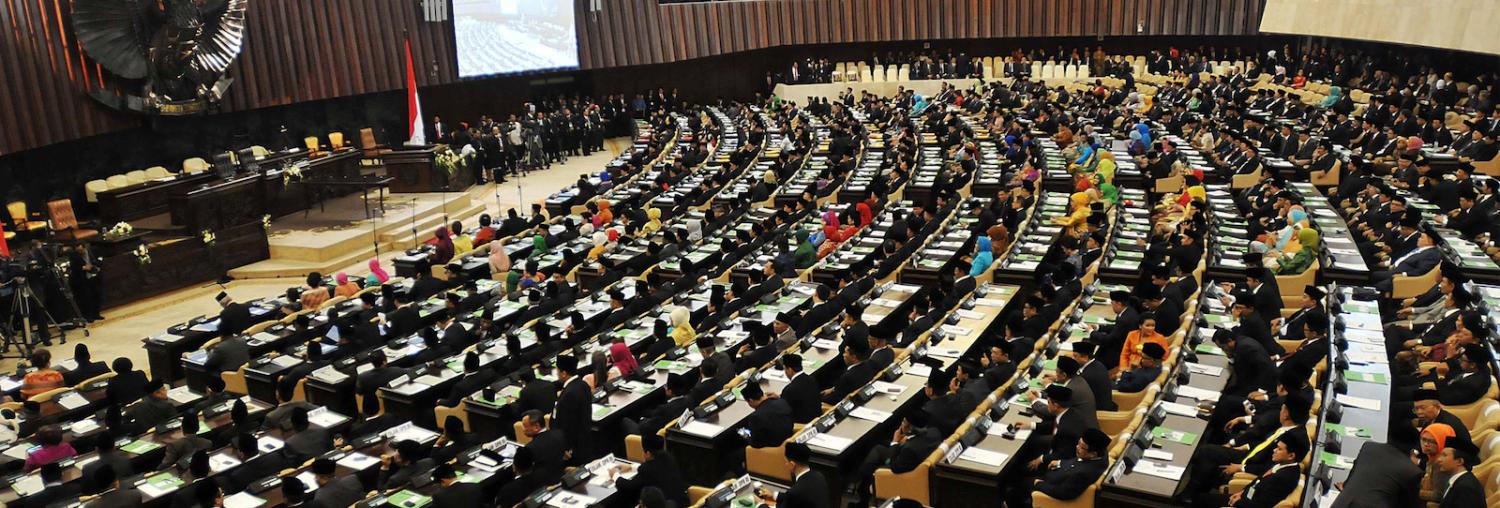How can we address the profound gender disparity that afflicts the vast majority of the world’s parliaments?
Fewer than 10 countries are close to parity between men and women in their main national legislative chamber and only 3 – Bolivia, Cuba, and Rwanda – have more women parliamentarians than men, according to the Inter-Parliamentary Union.
An entrenched patriarchal society, widespread vote-buying, and poorly run political parties more interested in rent-seeking than policy-making, directly undermine the effectiveness of Indonesia’s young democratic system.
Indonesia is one of many countries that use an electoral quota to try to reduce the imbalance in its main legislative body, the House of Representatives (DPR). Political parties must ensure that at least 30% of their candidates in each multi-member constituency are women.
Since the rule was implemented, the proportion of women candidates has increased steadily from 32% in 2004 to around 40% in next month’s legislative election, which is being held on the same day as the presidential election for the first time.
But the proportion of seats won by women parliamentarians has grown only haltingly, jumping from 11% in 2004 to 18% in 2009 before falling back to 17% in 2014, according to data collated by Ella Prihatini, a PhD candidate at the University of Western Australia.
That leaves Indonesia below the world average of 24% and the Asian average of 20%.
To tackle the problem, Indonesia needs to look beyond the quota to more structural problems that hold back women candidates.
Many of the issues they face – an entrenched patriarchal society, widespread vote-buying, and poorly run political parties more interested in rent-seeking than policy-making – directly undermine the effectiveness of Indonesia’s young democratic system.
“It’s not easy for anyone to run as a candidate in Indonesia but it’s especially tough for women,” said Delima Saragih, senior programme officer for the International Republican Institute, a US NGO that trains women candidates in Indonesia, at a discussion on women in politics hosted by the Jakarta Foreign Correspondents’ Club.
Part of the problem is that many political parties in Indonesia (there are 16 running in next month’s DPR election) have no systematic training for women candidates. They simply “fill out their lists with any old woman” at the last minute to meet the quota, according to Tsamara Amany Alatas, a 22-year-old DPR candidate in Jakarta for the Indonesian Solidarity Party (PSI).
The electoral system does not help. The 575-member DPR is elected through open-list proportional representation in multi-member constituencies. But with well over 100 names on each ballot paper, many voters simply choose a party and select the name at the top of that party’s list of candidates.
The number one and two slots, which have had the highest chance of winning historically, are often filled by men.
But rather than tinkering with the quota formula, young female politicians like Tsamara and Saraswati Djojohadikusumo, a DPR member from the Gerindra Party, want more focus on the quality of women candidates than the quantity.
“I’m a bit traumatised because I’ve had female colleagues who have no idea what we’re fighting for,” said Saraswati, who is the niece of Prabowo Subianto, the Gerindra patron who is challenging incumbent Joko Widodo for the presidency.
Tsamara also complained that some women candidates spend more time pushing for the “domestication of women” than they do fighting for women’s issues.
But Delima believes it would be a mistake to get rid of the quota, noting that only 17% of the candidates for Indonesia’s (relatively powerless) upper house, which has no gender requirements, are women.
Instead, she thinks political parties need to become more professional about training their candidates well ahead of elections to ensure they can campaign more effectively.
Campaign finance reform, which has been discussed for years, could also help women because the high cost of election campaigns, and rampant vote-buying, makes it very hard for new entrants to compete financially.
But there are few signs that Indonesia’s venal political parties would push for – or even accept – this level of reform to a system that gives them substantial power.
So, on election day on April 17, it will be down to the candidates themselves, and Indonesia’s 193 million voters.

